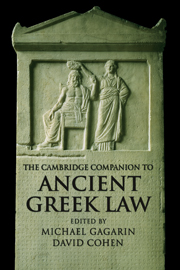Book contents
- Frontmatter
- Introduction
- Part 1: Law in Greece
- Part 2: Law in Athens I: Procedure
- Part 3: Law in Athens II: Substantive Law
- 11 Crime, Punishment, and the Rule of Law in Classical Athens
- 12 Gender, Sexuality, and Law
- 13 Family and Property Law
- 14 Athenian Citizenship Law
- 15 Commercial Law
- Part 4: Law outside Athens
- Part 5: Other Approaches to Greek Law
- Index
13 - Family and Property Law
from Part 3: - Law in Athens II: Substantive Law
Published online by Cambridge University Press: 28 August 2006
- Frontmatter
- Introduction
- Part 1: Law in Greece
- Part 2: Law in Athens I: Procedure
- Part 3: Law in Athens II: Substantive Law
- 11 Crime, Punishment, and the Rule of Law in Classical Athens
- 12 Gender, Sexuality, and Law
- 13 Family and Property Law
- 14 Athenian Citizenship Law
- 15 Commercial Law
- Part 4: Law outside Athens
- Part 5: Other Approaches to Greek Law
- Index
Summary
FAMILY
Marriage and Children
Although there are other corporate groups within the polis, for Aristotle the basic constituting element of the polis is the oikia, the family group. By oikia, Aristotle means the nuclear family, within which the relations between husband and wife, father and children, master and slaves assume legal significance (Arist. Polit. 1253b). Aristotle's approach is basically confirmed by the legal measures regarding family organization in Athens and these are not contradicted by fragmentary information on the law of persons in other poleis (even though the Spartan tradition gives a very different view of the family group, albeit one that is virtually impossible to verify).
The oikia is constituted by marriage (gamos). Marriage is virilocal: the woman proceeds from her father's house to her husband's. The marriage ceremony, which is undoubtedly of great social and religious importance, is not significant from a legal point of view. What is important, instead, is the agreement between the woman's father (or, after his death, her brother) and the future husband, according to which the woman will be “given” and “received.” In Athens this agreement is given the name engyē or engyēsis; in legal speeches it is used as proof that a marriage exists. In the case of an heiress (epiklēros), engyē did not exist: the woman was assigned, according to epidikasia, to the male relative who demonstrated his right over other relatives to succeed the dead man (see further Cantarella in this volume).
- Type
- Chapter
- Information
- The Cambridge Companion to Ancient Greek Law , pp. 254 - 266Publisher: Cambridge University PressPrint publication year: 2005
- 6
- Cited by



